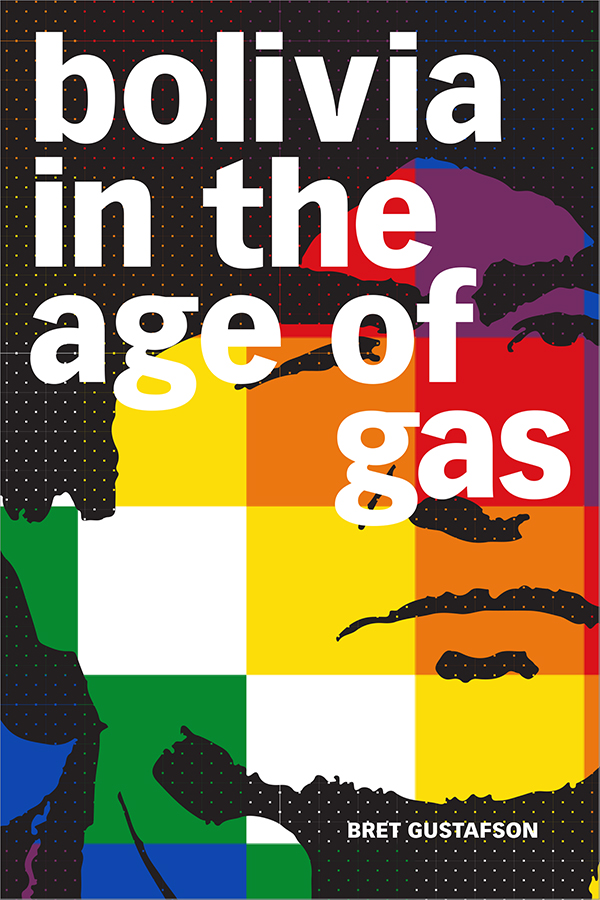Modern debates over energy and natural gas often center on environmental issues and global warming. Yet in places like Bolivia, where many citizens still use firewood as their main energy source, the conversation can sound much different. There, the desire for convenience and progress often overrides environmental concerns, and in some cases, also the rights and safety of indigenous people. Anthropologist Bret Gustafson is working on a book about gas and power in Bolivia. Here, he discusses the complicated relationship between energy, politics, the environment, and indigenous rights.
Transcript:

CN (host): Thanks for listening to Hold That Thought. In today’s podcast we’re traveling to South America – Bolivia, to be exact – with anthropologist Bret Gustafson. Back in the 1990s, Gustafson was spending a lot of his time in the southeastern part of Bolivia with an indigenous group known as the Guarani. At the time he was working on a book about the Guarani’s demands for language rights, education, and land. And on his many research trips he noticed a change sweeping the country.
BG (guest): During the latter part of my time there in the late 1990s and early 2000s, a new phenomenon hit, and that was the rush for natural gas.
CN: Gustafson witnessed international companies like the now infamous Enron rushing into Bolivia for natural gas. And in many cases, this activity unfolded across Guarani land.
BG: On top of a longer history of struggling for natural rights, they now had to contend with natural gas. An obvious decision for a next research project was to try to understand how this boom in natural gas was radically transforming their lives.
CN: To understand how lives in this region have changed because of natural gas, we first have to picture what life was like before. If you’re like many people, you might have an inaccurate vision in mind.
BG: When I say indigenous, a lot of people may imagine a pristine society, perhaps out in a remote area, and the big development machine comes in and threatens their way of life. That’s a nice, simple way of thinking, but it is very far from reality. In fact, indigenous peoples are modern, like you and me. They live in towns, cities, and small villages, often alongside people who don’t consider themselves indigenous. They work on ranches owned by non-indigenous landlords. They have jobs in the city. So you have a complex regional space.
CN: Within this complex space, there are cultural differences between the Guarani and many non-indigenous people. For example, the people Gustafson worked with in Bolivia often had a particular view of nature.
BG: When my Guarani friends go fishing, they consider it visiting a spiritual entity who cares for the fish, and much like someone who offers you food if you came to their house, that river entity is offering you fish. You better not take too much, or they may punish you with some sickness or misfortune.
CN: Here’s where we get back to the natural gas boom. Imagine, if you don’t feel this way already, that you have the sorts of beliefs that Gustafson just described. That you have a reciprocal relationship with nature, and that things like rivers are entities that should be respected. Now imagine seeing the emergence of the natural gas industry in your back yard. Not just fishing requires water.
BG: You need water to drill. You need water to inject the drilling muds, and they produce dirty water after you drill. And the entire region where natural gas is being developed is already water scarce.
CN: On top of all of the environmental problems, the natural gas industry brought economic and employment problems to the Guarani.
BG: Natural gas also brings in outside workers. The Guarani who live there don’t have a lot of skills, so they may get hired to clean up around the gas plant or build fences or something like that. The well-paid jobs are held by mostly men who come from the city for a couple weeks and then go back home.
CN: And along with employment problems, social problems come, too.
BG: As we see throughout the world, when you have a gas or oil camp like that, you get other things like prostitution in the environs of gas camps. There are a lot of unsettling things happening in this region, and that is what I am trying to understand.
CN: As Gustafson looked more and more at how natural gas was shaping lives in Bolivia, in 2005 a different type of change came across the country – political change.
BG: That was the actual election of an indigenous leader. He wasn’t Guarani; he was Aymara. Evo Morales. This was also a dramatic transformation for the entire country.
CN: Morales was part of a movement that sought to lessen the amount of control that outside corporations had over the country and the economy. Also, like the Guarani, he seemed to have a particular view of nature.
BG: He came to office invoking the Pachamama—Pachamama means the Mother of Time and Space, or Mother Nature, if you want—and talking in those terms that we are not evil capitalist, we respect Mother Nature.
CN: With everything we’ve heard so far about the natural gas industry, you might now think that Morales would have worked to slow down the boom. But here’s the twist. That didn’t happen. In fact, Morales increased the production of natural gas. Why?
BG: Well, you probably cooked your breakfast, if you cooked this morning, on natural gas. A lot of Bolivians don’t have that luxury. They either use firewood or, if you live in a city, you may have to seek out on a day-to-day or weekly basis a canister of LPG, the kind you may put under your grill. So the fact that when the indigenous president, Evo Morales, took power, he said, “I’m going to make it a priority to provide gas to the citizens and not just to foreigners,” that was a very popular move. Every time they install a new part of a city, the president goes, and there’s a big fanfare. He’ll go into the kitchen of this humble abode and turn on the gas, and it is taken as a dramatic sign of progress for the country.
CN: In the United States, where for the most part houses have access to convenient energy, it’s fairly easy to think critically about industry and the environment. But if you were a housewife who has to stand in line and lug home a big canister of gas for cooking, the idea of bringing energy into your home would understandably be pretty exciting. On top of spreading natural gas to more people, president Morales renegotiated contracts with the energy companies to keep more of the profits in Bolivia. In earlier eras, business interests were favored over national ones.
BG: When Evo Morales forced the companies to come to the table, it was also very popular. They said, “Oh no, this is socialism. This is communism.” And then they sat down and signed the contracts, because the market for gas exists and Bolivia has the gas.
CN: This meant more money for the Bolivian treasury, and for social programs.
BG: If you are an expectant mother, you actually get paid to go to the doctor. They are trying to reduce infant mortality. If you are an elderly person who never had a formal job or a formal pension, you can get an annual elderly payment. School children can get annual payments, which are incentives to stay in school. The government has built infrastructure, roads, housing, schools, and hospitals.
CN: ..the list goes on and on. And once you hear about all these improvements, it’s a bit easier to understand why a country like Bolivia, and its president, would want to take advantage of its natural resources. But where does that leave the environment? And where does it leave people like the Guarani?
BG: Contradictions come between those who have the benefits of consumptions and those who have to bare the price of where it’s produced. This has presented some challenges to indigenous people like the Guarani: when you oppose natural gas development, are you actually opposing now the development of your own country and a president who supposedly has sympathies with your rights? It has become rather more complicated in the past couple years.
CN: So, knowing about at least some of the drastically negative, and also some of the drastically positive, effects of the natural gas industry in Bolivia – in a perfect world, where should they go from here?
BG: Anthropologists are really—or we are supposed to be very intellectually humble. We are more likely to say it’s complicated than to say this is the absolute truth and this is what they should do. However, one thing that I and some other colleagues working in Bolivia are trying to do is to get beyond simply pointing out the contradiction between the indigenous president and the assault on Mother Nature, and we are trying to rethink for the future economic alternatives. If we are going to say that natural gas has negative impacts, then what other economic alternatives does a country like Bolivia have? Can Bolivia address its economic needs without doing what extractivism has done elsewhere, which is basically exhaust the environment.
CN: The jury is still out on that question, but overall Gustafson hopes to see more small-and medium-scale industry development in Bolivia, in areas like manufacturing and agriculture. Smaller businesses can be more environmentally friendly, and better for employment. Global market niches, like the popular food quinoa, can also be good for the country. But even beyond Bolivia, there’s a bigger question at stake.
BG: One of the things that anthropologists who look at energy and global warming and the politics of poverty in a place like Bolivia, and in the bigger picture, what we all need to understand is how we are going to get beyond our dependence on fossil fuels and how we are going to grapple with our need for energy and the impacts on the environment and on people. Drawing connections between places like Bolivia and places like the United States, at least in my experience, we can get at the bigger picture: in what ways are dependent on these forms of energy, and as human beings, do we have the capacity to imagine a world otherwise? If we don’t have that capacity, we are all cooked.
CN: Many thanks to Bret Gustafson for joining Hold That Thought. For many more ideas to explore, please visit HoldThatThought.wustl.edu or find us on iTunes, Stitcher, PRX, SoundCloud, Facebook, and Twitter. I’m Claire Navarro. Thanks for listening.
Credits:
Free Music Archive: Aaron Ximm Jared C. Balogh, Lee Rosevere, Rushus, Zeke Healy


